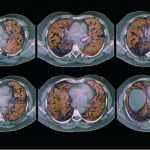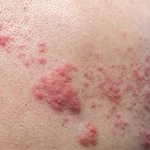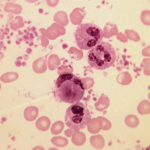According to results of a recent study of all-cause and cause-specific mortality trends of end-stage renal disease due to lupus nephritis from 1995 to 2014, the all-cause premature mortality rate improved among white, African American and Hispanic patients, with reduced risk of death from CVD and infection. Jorge et al. observed a 32% reduction in mortality. This improved survival may be explained by a combination of improvements in the management of ESRD and of underlying SLE…

Diagnosing & Managing Pulmonary & Kidney Manifestations in Lupus
CHICAGO—In systemic lupus erythematosus (SLE), most types of severe pulmonary manifestations are relatively rare, but it’s crucial they be caught because of the potentially dire consequences, said Richard Silver, MD, professor in the Rheumatology Division at the Medical University of South Carolina, Charleston, at the 2018 ACR/ARHP Annual Meeting. Pulmonary Manifestations Parenchymal disease—seen in the…

These 3 Tough Cases from the 2018 Thieves Market Underscore Need for Clinical Diligence
CHICAGO—In the Thieves Market session at the 2018 ACR/ARHP Annual Meeting, rheumatologists from around the country presented a slate of challenging cases that emphasized the importance of clinical persistence and attention to detail, and the need to consider diagnoses that might not be common or obvious. Three of them are summarized below. (Look for more…

Alterations in Macrophage Activation May Signal a Lupus Flare
New data suggest myeloid cells in SLE patients skew B and T cell activation status toward the M1 proinflammatory phenotype, thereby directing SLE flares and remission…

PAD2 & PAD4 Modulate Immune Response in TLR-7-Dependent Lupus
A study in mice suggests that targeting peptidyl arginine deiminases in lupus patients may have a therapeutic role in T cell-mediated diseases, affecting innate and adaptive immunity, as well as modulating dysregulated toll-like receptor 7-dependent immune responses…

Intronic Polymorphism Associated with Risk of Neurological Disorders in SLE
Patients who develop neuropsychiatric symptoms of SLE have a small nucleotide polymorphism (SNP) in an intron in a Ca++ ion channel gene that influences some, but not all, events regulated by Ca++. The SNP appears to influence activation induced apoptosis rates and cytokine production, specifically IL-4, in a disease- and genotype-specific manner…
SLE Patients May Not Receive Enough Cardiovascular Disease Assessment & Treatment
Systemic lupus erythematosus (SLE) is associated with high rates of cardiovascular disease. However, research has shown that aggressive risk assessment with lipid screenings and treatment with statins may be suboptimal for these patients. A new study compared the rates of screening and treatment between SLE patients, diabetes mellitus patients and the general Medicaid population. The results: Despite having an elevated risk of CVD, SLE patients received less lipid testing and fewer statin prescriptions than other patients…

Zoster Reactivation Risk in Patients Treated with Cyclophosphamide
Varicella-zoster-virus (VZV) reactivation, which can cause patients to develop herpes zoster (i.e., shingles), occurs more frequently in patients with systemic vasculitis and systemic lupus erythematosus (SLE) who have received intravenous cyclophosphamide than in otherwise healthy adults, according to a retrospective study published in The Journal of Rheumatology by researchers in France.1 The study also shows…
Silent Cardiac Impairment in SLE
Drug-naive, new-onset SLE patients, even those with inactive disease, are likely to have silent cardiac impairment, according to a new study by Guo et al. Cardiac involvement is the leading cause of death in patients with lupus, and the estimates of cardiac impairment in SLE range from 31–70%. Cardiac impairment can remain unrecognized until after autopsy. These researchers investigated the use of cardiac MRI to explore early warning signs of silent cardiac involvement in SLE and determine treatment timing…

Pediatric Lupus Outcomes: Researchers Follow Kids into Adulthood
A study published in the May issue of Arthritis Care & Research may be the first to examine the long-term outcomes of childhood-onset lupus, otherwise known as pediatric systemic lupus erythematosus (SLE), a chronic, multisystem autoimmune disease with a highly variable clinical course. Previous studies examined cross-sectional views of damage accrued. According to the Childhood…
- « Previous Page
- 1
- …
- 18
- 19
- 20
- 21
- 22
- …
- 43
- Next Page »